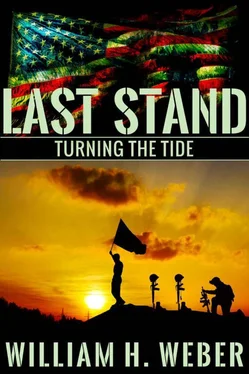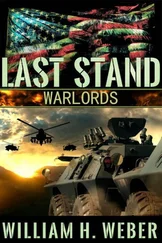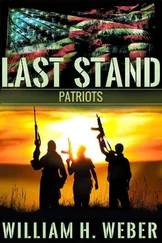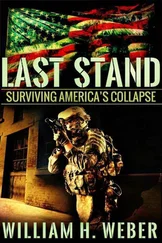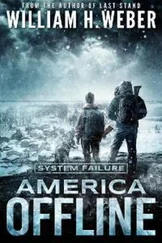“That’ll only offer the Chinese a justification for even worse atrocities.” John turned to Moss. “Any word on those leaflets Emma was working on?”
“I think she’s only just started,” Moss replied, leaning back in his chair. “My guess is if we put a few more people on it, we can have enough for a drop by tomorrow.”
“What drop?” Brooks asked.
“Over the Jonesboro concentration camp,” John said. “We need to let them know we haven’t forgotten about them.”
The expression on General Brooks’ face made it clear offering hope to imprisoned Americans wasn’t high on his list of priorities. “Anything else?” General Brooks asked, annoyed.
“The detonation of that EMP will surely cripple the enemy’s ability to wage war. Now we wait for word from General Dempsey on what to do next.”
“If he knows anything,” Reese said, “he’ll launch an attack as soon as possible.”
“It would be wise if we leave the strategic decisions to those in charge,” General Brooks snapped.
The look in Reese’s eyes was calm, but John could tell the sniper was battling the urge to jump over the table and throttle the man.
“All right. This meeting is hereby adjourned.”
They all rose from the table and filed from the room. All except for John and General Brooks, who was still gathering his papers. John went to him. “I think it’s time we began getting Oneida on a war footing, don’t you think? And I’m not only talking about soybeans. Once we get that power back on, as limited as it might be, we’ll be able to create a small munitions factory and pump out mortars and Molotov cocktails.”
As usual, Brooks looked skeptical. “Where are we going to get the metal and components for that kind of thing?”
“We have all the components we need.”
“What are you talking about?”
“Mortar tubes can be made from schedule 80 steel pipe, the same stuff used as the electrical weatherhead on the houses in town. Another option is axle tubes from old trucks. Listen, everything we need is at our fingertips as long as we’re open and creative enough to recognize it’s there. All that’s missing is power. And whatever we lack from wind, we can get from using engines from trucks and abandoned military vehicles. We’ve been on the defensive for so long we haven’t had a chance to use what we’ve already got to get back on our feet.”
“And what’s to stop the Chinese from catching wind and bombing our factories into the ground?”
“Nothing,” John said. “But my guess is right now they’ve got bigger fish to fry.”
“Hey, if it’ll get you off my back for a while, then go ahead.”
John left and headed for the radio room, where he found Rodriguez reinstalling the equipment they’d kept sealed in the Faraday cages during the recent operation.
“I have a message for General Dempsey I need you to deliver to Wilbur.”
“The pigeon man?” Rodriguez asked, plugging his earphones in.
John scribbled down the message on a small slip of paper: Mission successful. EMP detonated with noticeable effect. Awaiting further orders. He folded it up and slid it into a tiny pouch Wilbur would later attach to the bird. “About that other thing we discussed earlier…”
“About suspects?”
John nodded.
“Nothing so far.”
“Roger that. Keep looking.”
John turned to leave the radio room only to find a female soldier standing in the doorway. She was a redhead in blue and black fatigues. The name tag on her chest read O’Brien.
“Colonel Mack,” she said sheepishly.
“Yes. What can I do for you?”
“I believe I met your son at the front.”
John’s eyes grew wide. “Gregory?”
“He was with an older boy.”
“Brandon.”
“Yes, they were both very eager to fight.” Her eyes fell. “I was there when the whole center line folded in on itself. It was pure chaos. We fled the front lines, but not before I saw that whole part of the trench surrender to the enemy. I hesitated to tell you before in case you were upset that they surrendered, but I figured, if it was me, I’d want to know the truth no matter what.”
John swallowed hard, fighting back the tears. “So they’re alive?”
O’Brien nodded.
He cupped her shoulder. “You did the right thing.”
She smiled. “You’re not disappointed in them?”
“Not in the least. They did the only thing they could. But it also means there’s still a chance we can get them back.”
Knoxville, three hundred and sixty-five days before EMP
A month after returning from his final deployment in Iraq, John found himself at the Back Door Tavern on Kingston Pike, seated at the bar and working on his fifth beer. The mirror behind the bar showed a grizzled and tired man looking back at him. John’s dark, normally neatly cropped hair hung past his ears, pulled back from his forehead with nothing more than the sweat of a man who hadn’t washed in a handful of days.
The place wasn’t so much seedy as it was small. Behind John was a row of booths and in the corner a pool table where two men cracked balls back and forth, a noise which made John jump whenever he heard it, although nowadays just about any loud noise set him on edge.
The tavern door opened, letting in his friend James Wright along with a burst of mid-afternoon sunlight. Lanky but powerful, Wright had served under John as First Sergeant while they were stationed at Camp Stryker in 2006, around the time that PFC Steven Hutchinson and PFC Ryan S. Davis had been abducted and murdered by insurgents.
While on deployment, the men in his regiment had taken to calling the sergeant Johnny Cash on account of his deep voice and obsession with striking it rich. Like so many other vets, Wright had also changed significantly since returning from Iraq. The most noticeable difference was that he hardly smiled anymore. James slid into the seat next to him.
Next to his empty beer mug, John’s cell phone started to vibrate. Diane was calling him again.
“You gonna take that, LT?” James asked, watching the phone buzz away.
John glanced down at Diane’s smiling picture on his display screen. “Not just yet. And stop calling me LT. It’s John or nothing.”
James nodded. “I can drink to that.” He waved the bartender over, a fiftysomething in a tank top three sizes too small. “Two beers.”
“I thought the wife told you not to come back here, that if she caught you drinking again she’d toss you out on your keister?” John asked.
“She did. Heck, I’m supposed to be at Jack in the Box, getting food for the fam. I’ll just eat a mint on the way home and tell her the car ran outta gas.” James’ hand was on the bar, his fingers twitching. John pretended not to notice, especially since his often did the same.
The two drank in silence for a moment, but James wasn’t able to sit still. His gaze kept returning to those two men playing pool, then to the entrance and back toward the emergency fire exit in the rear. John recognized immediately what he was doing. He’d done the same the minute he entered the bar. Wright was making a threat assessment and searching for possible routes of escape.
Over in Iraq, the risk of coming under attack had been a constant concern. It didn’t matter if you were back at base or on a patrol. Death could be around every corner, behind a smiling face or a double-parked car. IEDs detonating under your vehicle, snipers shooting you in the throat, or insurgents lobbing mortar rounds into the base and running away—those were the forms that threat normally took. Never-ending danger and extreme frustration at an enemy who refused to fight toe to toe were just a few of the realities men like John and James had faced overseas, many of which they’d brought back with them into civilian life.
Читать дальше
